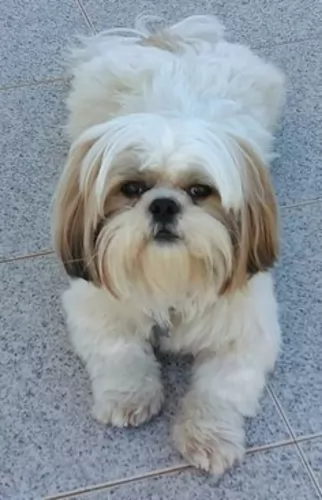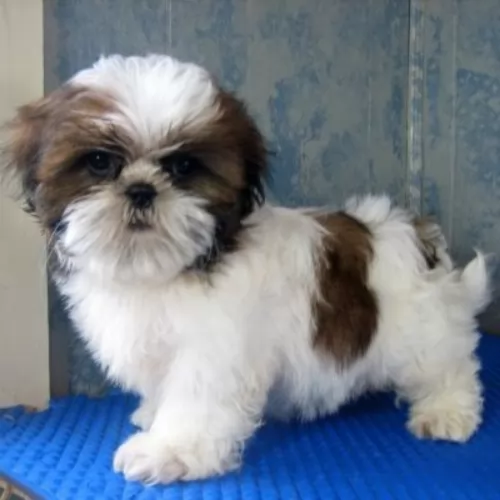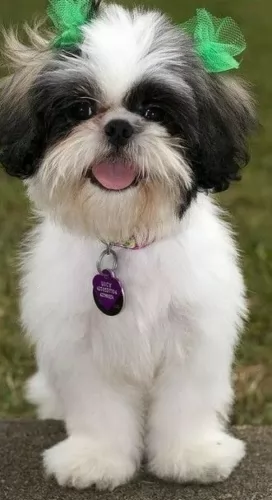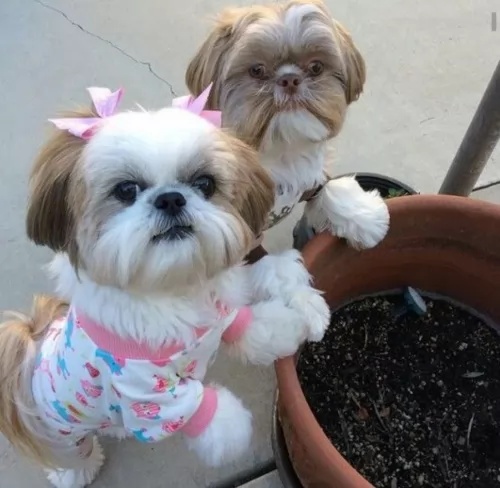 Petzlover
PetzloverBilly is originated from France but Shih Tzu is originated from China. Billy may grow 40 cm / 16 inches higher than Shih Tzu. Billy may weigh 25 kg / 56 pounds more than Shih Tzu. Billy may live 3 years less than Shih Tzu. Billy may have less litter size than Shih Tzu. Billy requires Moderate Maintenance. But Shih Tzu requires High Maintenance
The Billy (or Billie) Dog is a rare breed developed in France and mostly still only found in France. Created in the 19th century by Monsieur Gaston Hublot de Rivault and named after his home, Chateau de Billy, he is hunting dog of high quality. The Billy dog was developed by crossing the Poitevin’s original three lines – the Larrye, the Ceris and the Montemboeuf. In developing the Billy, Rivault favored the colors found in the Ceris and Montemboeuf strains as opposed to the tricolors of the Larrye strain. The Billy is a scent hound from all the lines leading back to the monks of the Saint Hubert Monastery in the middle ages, in Belgium, then refined in Gaul (France). The Billy line was considered the most elegant French breed and they were the last breed to come from that large scent hound type that the French nobility and royalty loved to breed.
In 1886 the Federation Cynoloquique Internationale established the standard for the Billy breed. The breed was a great hunter with resilience, speed, scenting and fortitude. The Billy hunted in large packs in pursuit of Wild Boar and Roe Deer. This was accomplished by the crossing of great hunters developed for their specific skills. The Ceris was amazing in its skill to hunt down wolves and hares. The Montemboeuf was a large, elegant dog that hunted wild boar and Larrye for his strong scent ability. Since these three breeds were true French breeds, the Billy was a true aristocratic scent hound in a pure scent hound line.
This gregarious, handsome dog became extremely popular in France in the 19th century. Unfortunately, the World Wars of the 20th century would take their toll on this rare breed and they were almost extinct by the late 1900’. There were only two hounds left by the end of the Second World War. Anthony Rivault, the son of Gaston, set about saving the breed by incorporating the lines of Harrier, the Poilevin and the Porcelaine with the two remaining hounds. From there the breed has been revived and is no longer on the verge of extinction. They are still rare and certainly not “popular”, but they are excellent hunters, especially hunting in packs. Today they are considered one of the breeds used to develop the Grand Anglo-Francais Blanc et Orange in France and there are several packs that hunt roe deer in France, while a couple packs are used to hunt wild boar.
 The Shih Tzu is an Imperial Chinese breed developed by palace breeders hundreds of years ago with breed stock from the Tibetan lines. It is quite probable that the Shih Tzu was originally a cross between two Sino-Tibetan ancient dogs – the Pekingese and the Lhasa Apso. Based on their looks, the Shih Tzu means the lion dog, but they were really very pampered palace dogs living with the Chinese emperors and families. The emperors were always gifting the breeders who developed the most affectionate, gentle and beautiful Shih Tzus.
The Shih Tzu is an Imperial Chinese breed developed by palace breeders hundreds of years ago with breed stock from the Tibetan lines. It is quite probable that the Shih Tzu was originally a cross between two Sino-Tibetan ancient dogs – the Pekingese and the Lhasa Apso. Based on their looks, the Shih Tzu means the lion dog, but they were really very pampered palace dogs living with the Chinese emperors and families. The emperors were always gifting the breeders who developed the most affectionate, gentle and beautiful Shih Tzus.
Until the 1930’s the Shih Tzu was not known to the world outside the emperor’s palace. Once the breed did come out from behind the palace walls, they were immediately popular. Much debate went on about how to refine the breed as clubs began to spring up in Peking and then in England. It was not until 1969 the Shih Tzu was recognized and entered in the AKC Stud Book.
While the original Shih Tzu might have been a mix between the Pekingese and the Lhasa Apso, today’s breed spread around the world after the second world war. In Europe in the 1930’s the breed was classified as Apsos. In 1935 the first Shih Tzu Club of Europe was formed, and the first standard was written, and the breed was categorized as the Shih Tzu.
Following World War II, soldiers brought the dogs to the States from Europe. By the 1950’s the breed was growing in popularity and the AKC recognized the breed in 1969 as members of the Toy Group. They are now recognized by all major kennel clubs throughout the western world. They are recognized by the Federation Cynoloqique Internationale in the Companion and Toy Group, among Tibetan breeds.
The Shih Tzu is a good watchdog, but it was bred to be a companion animal. It is a friendly, open breed that welcomes strangers. They are great with other animals and children as well as adults.
The Billy dog is powerful, beautiful and built extremely well. He is large but he should also be light weight and lean. He has an athletic look, powerful muscles, and strong bones. He has floppy ears, dark eyes with dark rims and a white coat. This breed has a medium size head with a domed forehead and square muzzle. The ears are high on the head, flat and floppy while the neck is long and strong. Shoulders are also long and the back broad, the thighs muscular and the feet round. He has a long fluffy tail. The coat is short and can be seen through to the skin. He has white skin with brown spots and the fur is white or off white. The females are smaller than the males. He is a great family companion as well as a hunter. They have high pitched voices and they can be howlers. They have a strong prey drive and are great hunters. They can be great companion dogs for any family, just watch them with small children and small animals. They are big enough to need a lot of space and a lot of exercise. Scent hounds can be stubborn, and that trait is not lost on the Billy dog.
 This is a breed of lively, sturdy and alert little dogs with a beautiful double coat that is flowing and long. In its full glory the Shih Tzu coat is touching the floor all the way around the dog. The dog’s bearing is as royal as its history, arrogantly carrying his head high and his tail curving over his back.
This is a breed of lively, sturdy and alert little dogs with a beautiful double coat that is flowing and long. In its full glory the Shih Tzu coat is touching the floor all the way around the dog. The dog’s bearing is as royal as its history, arrogantly carrying his head high and his tail curving over his back.
The Shih Tzu is a solid, compact breed with weight and substance. They may be a small dog, but they are a strong one. They have large dark eyes with a short muzzle and fur covered drop ears. They are just a little longer than they are tall with a distinct underbite.
There are a few differences between the European or UK Kennel Club standard and the American Kennel Club AKC standard. As opposed to the UK standard the AKC standard states that:
• The hindquarters are muscular while the front are straight. They are balanced in that they are not too long or too short.
Even though the Billy Breed is very rare and faced potential extinction it is a terrific sporting dog who loves children, other dogs, and adults. He could be a good family dog if his exercise needs are met. He is social, gregarious, and gentle with people. They are happiest in a pack and do not do well in a one dog household. They form extremely strong bonds with their people and household. They are friendly and outgoing. This makes them a poor choice for guard dog. They have an exceptionally well-developed prey drive do they might be aggressive toward any animal smaller than them. This includes the family cat, other smaller dogs, hamsters etc.
 2.Special talents – they were bred to be companion animals. They are friendly and loyal.
2.Special talents – they were bred to be companion animals. They are friendly and loyal.
3.Adaptability Yes very much so. They can live in an apartment or on a farm. It doesn’t matter and they don’t need a yard.
Despite their history of almost becoming extinct the Billy dog is a hearty and healthy group. They do tend to get Bronchitis and colds due to the short, thin coat. Keep them indoors during winter. Another area of concern is the ears. They are prone to ear infections so keep their ears clean. They should not be exposed to cold weather. The Billy life expectancy is 10-14 years which is very good for such a large dog.
 For many breeds that have the advantage of isolation like the Shih Tzu did with the emperors of China usually have very little genetic health issues. Most of the breed is indeed healthy but there are some issues.
For many breeds that have the advantage of isolation like the Shih Tzu did with the emperors of China usually have very little genetic health issues. Most of the breed is indeed healthy but there are some issues.
• Brachycephalic airway obstructive syndrome due to the shape of their face and head causes them to have breathing issues. They cannot handle heat and they cannot swim. They can have an upper airway obstruction that makes it hard for them to breath. If this is bad enough, surgery may be required.
• Hypothyroidism – thyroid does not produce the hormones necessary for metabolism to work effectively. This can lead to weight gain, hair loss, lethargy and muscle loss. It can be treated effectively.
• Issues of the eyes include – cataracts, corneal dryness and inflammation, progressive retinal atrophy, improperly closing eyelids and retinal detachment.
The Billy dog is large, muscular and lean. Do not overfeed him, but you can safely free feed. Watch to be sure he does not gain too much weight and if he does go to two feedings per day.
As previously mentioned this is a healthy, long-lived dog. Watch for ear infections and keep him out of extreme cold.
This is a very athletic, active hunter, who needs a lot of exercise. Daily walks are good, but he needs 45 to 60 minutes of exercise every day. Remember he was bred to hunt and loves to do so. Find activities that let him use his athletic skills and strong sense of smell. He needs a big yard to romp in. He will excel at obedience, barn hunt and agility. A lure game might be good also, but he would be happier with a scent oriented “find it” game.
 1.Feeding the puppy – this is a toy dog so don’t overfeed. They have a tendency to become obese. Calorie and weight level need to be calculated with any diet you feed. The diet should be high quality with plenty of protein made for toy dogs. Feed the puppy at least 3 times a day, maybe four in very small amounts, never more than ½ cup per day.
1.Feeding the puppy – this is a toy dog so don’t overfeed. They have a tendency to become obese. Calorie and weight level need to be calculated with any diet you feed. The diet should be high quality with plenty of protein made for toy dogs. Feed the puppy at least 3 times a day, maybe four in very small amounts, never more than ½ cup per day.
2.Feeding the adult - this is a toy dog so don’t overfeed. They have a tendency to become obese. Calorie and weight level need to be calculated with any diet you feed. The diet should be high quality with plenty of protein made for toy dogs. Feed the adult once or twice a day in larger amounts than the puppy but never more than ¾ of a cup per day.
3.Points for Good Health - most Shih Tzu’s are hardy with exceptionally good health.
This is a pampered, not high energy dog. However, she still needs playtime, which can be indoors and short walks outdoors every day.